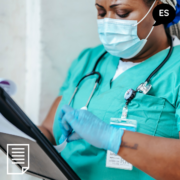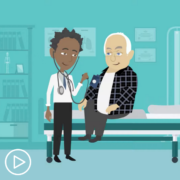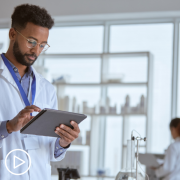CLL Research Highlights: What Should Patients Know About?
CLL Research Highlights: What Should Patients Know About? from Patient Empowerment Network on Vimeo.
What should CLL patients know about recent research updates? CLL expert Dr. Adam Kittai shares recent research highlights, including updates on BTK inhibitors, BCL-2 inhibitors, and monoclonal antibodies.
Dr. Adam Kittai is a hematologist and an assistant professor at the The Ohio State University Comprehensive Cancer Center – The James. Learn more about Dr. Kittai, here.
See More from CLL Clinical Trials 201
Related Resources:

|
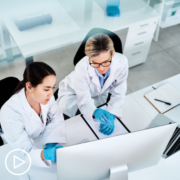
|
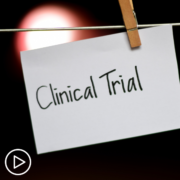
|
Transcript:
Katherine:
I understand that CLL researchers met recently at the annual American Society of Clinical Oncology meeting, also known as ASCO, to share their research. Are there highlights from the meeting that patients should know about?
Dr. Kittai:
Yeah, so this time of year, there are two main conferences actually that are very important to the CLL groups at large, as well as the oncology community. So, there’s ASCO and then there’s EHA, the European Hematology Association. And in general, there was a lot of exciting things at both of these conferences.
In CLL, we have two main treatments that we’re really focused on. One is called the BTK inhibitors, which is ibrutinib, acalabrutinib, and zanubrutinib that you may have heard about. And the other treatment regimen is called venetoclax, and that’s usually paired with something called obinutuzumab. So, right now we’re either using the BTK inhibitors or the venetoclax as our frontline therapies. And typically, when patients progress on either one of those treatments – their disease gets worse – we switch to the other one.
And so, what I’m getting to be that right now, that paradigm of starting with one therapy – the BTK inhibitors or the venetoclax – and then switching to the other, or vice versa, is being challenged. How that’s being challenged is combining the two medications together to see if combining them together is better than giving them sequentially. So, I think this is the primary research that’s being looked at in the world of CLL and we got some updates to show that the combination of the BTK inhibitors, plus the venetoclax, is looking quite good. It’s looking like it’s inducing deep remissions in some of our patients.
Some of the challenges here though that we still need to figure out is that a lot of these combinations are leading to more toxicity. So, ultimately, I think we’re going to have a discussion about who is the appropriate patient for the combination, as opposed to giving it sequentially.
There’s also a lot more research going on, looking at what we call randomized trials, which we’ll get to in a second, to determine if the combination is better than giving it sequentially. Right now, we just have what we call single-arm studies that kind of show safety and how well the trial works. But really, the definitive clinical trials – and once again, we’ll get to this a little bit later – are going to be randomized study where we randomize patients to the combination versus the sequential therapy to determine if doing it together is better than doing it sequentially.
So, I would say that this new treatment paradigm of combining our two main treatments up front is looking quite good. We’re worried about some of the toxicities when we combine these medications, and we’re still not quite sure if combining them is the right approach, if it actually is superior to giving them sequentially. So, I think that’s the name in research right now for CLL, whether or not combination therapy is better than sequential therapy. The jury is still out, but some of the new data we saw was exciting.
Katherine:
So, how can patients stay up to date on research like this as it develops?
Dr. Kittai:
Yeah, great question. So, for one, you can talk to your physician. A lot of the physicians will go to either ASCO or the European Hematology Association and be able to come back with some of this data to share with their patients. And then also, there’s a lot of smaller conferences that local oncologists will go to get highlights from these particular conferences, where they also will come back to the patient to let them know some of this highlighted research. I think that’s probably the easiest way for patients to get access to this research. And Google’s our friend, right? And so, a lot of things are available on Google if you know where to look for them.


